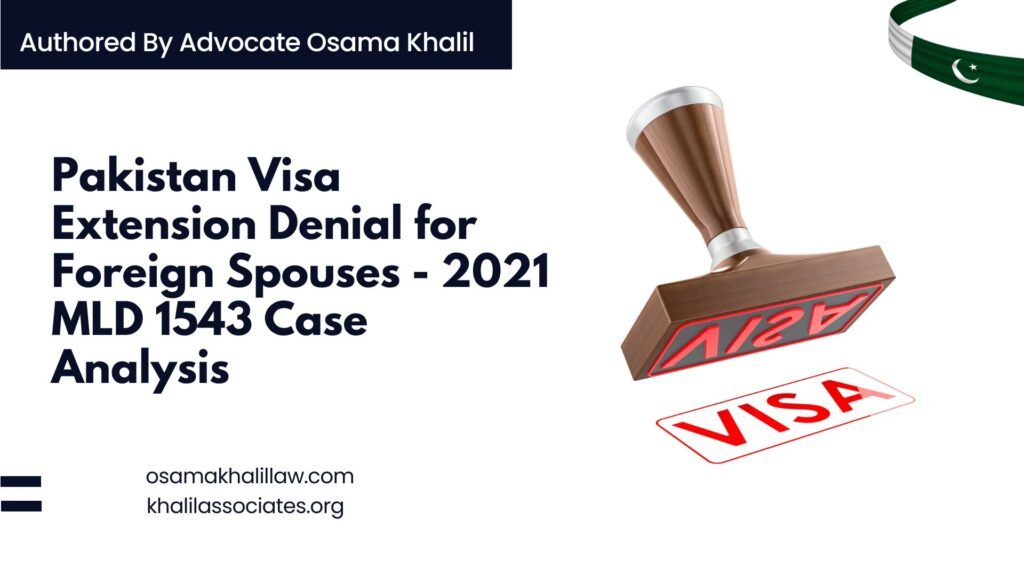
The Islamabad High Court decided a significant case, reported as 2021 MLD 1543, which clarifies the rights of foreign nationals married to Pakistani citizens. This case involved Maryam Begum, a Bangladeshi citizen, who challenged the government’s refusal to extend her visa. The court’s decision provides crucial guidance for many foreigners residing in Pakistan based on family ties.
Who Were the Parties in the Case?
The petitioner was Maryam Begum, also known as Ms. Moni, a citizen of Bangladesh. She filed the case against the Federation of Pakistan, specifically the Ministry of Interior. The Ministry of Interior is the government body responsible for issuing and extending visas for foreign nationals in Pakistan.
What Were the Facts of Maryam Begum’s Case?
Maryam Begum originally came to Pakistan from Bangladesh in 1996 on a “House Maid” work visa. In 1998, she married a Pakistani national, Syed Mazhar Hussain Zaidi. For many years after her marriage, the authorities granted her visa extensions. Initially, she held a “stay with husband” visa, but later, the government classified her visa as a standard “Family Visit Visa.” She continued to receive extensions on this visit visa until May 2020. However, in September 2020, when she applied for another one-year extension, the Ministry of Interior refused her request without providing a detailed reason.
What Was the Core Legal Question?
The central legal issue for the court was whether a foreign national married to a Pakistani citizen has a vested right to visa extension indefinitely. In simpler terms, does marriage to a Pakistani automatically grant a foreigner the legal right to stay in Pakistan forever?
The Court’s Decision and Its Reasoning
The two-judge bench dismissed Maryam Begum’s appeal. They upheld the government’s decision to deny her visa extension. The court explained several key reasons for its judgment.
First, the court emphasized that a visa is a permission to enter and stay in a country for a specific period. It is not a permanent right. Granting or extending a visa is a privilege that falls within the discretion of the government. The court found that the government did not exercise this discretion in an arbitrary or unfair manner in this case.
Second, the judges pointed out that Maryam Begum had been living in Pakistan for over 23 years. If she wished to make Pakistan her permanent home, the proper legal pathway was to apply for Pakistani citizenship under the Citizenship Act, 1951. The court specifically noted that during the proceedings, her lawyer admitted that she did not want to apply for citizenship because she wished to retain her Bangladeshi passport. Therefore, she was choosing to remain a foreign national, and as such, she remained subject to the country’s visa laws for foreigners.
Understanding the Concept of a “Vested Right”
The court repeatedly stressed that there is no vested right to visa extensions for any foreigner. A vested right is a legal right that is absolute and unconditional. The court ruled that the extension of stay on a visit visa, even for family reasons, is not an absolute right to stay. The government must consider factors like national security, public policy, and immigration rules when making these decisions. Because the petitioner could not prove that the government’s decision was malicious or irrational, the court would not interfere with it.
What This Judgment Means for Others
This judgment sets a clear precedent for all foreign nationals married to Pakistanis. It clearly states that marriage to a Pakistani citizen does not automatically guarantee a permanent visa entitlement. While spouses can and should get visit visas, they must understand that these extensions are not guaranteed forever. The government can refuse an extension if it deems it necessary.
The judgment also highlights the important distinction between a visa and citizenship. A visa is a temporary permit, while citizenship confers permanent rights. Foreign spouses who truly plan to settle in Pakistan permanently should seriously consider applying for citizenship instead of relying on perpetual visa extensions.
Conclusion and Key Takeaway
The ruling in the case of 2021 MLD 1543 provides much-needed clarity on Pakistan’s immigration laws. The Islamabad High Court firmly established that a foreign national does not possess a vested right to visa extension based on marriage alone. The right to stay is contingent on the discretion of the authorities, which must be exercised fairly but is not subject to demand as a legal right. The long-term solution for foreign spouses is to pursue citizenship through the proper legal channels if they seek a permanent right to stay in Pakistan. This case ultimately reinforces the principle that immigration control is a fundamental right of every sovereign state.
Legal Assistance
For professional legal guidance and support in immigration matters, you may contact:
Mr. Osama Khalil
Lawyer & Legal Consultant
📞 Phone: 0316-1829946
📧 Email: contact@osamakhalillaw.com | contact@khalilassociates.org

При планировании визит на Тенерифе, обязательно изучите с текущей погодой по месяцам — главным образом если направляетесь в переходный период, как вариант в ноябре или феврале. Это способствует определить оптимальные пляжи и места, включая Monkey Park Tenerife, Lago Martianez или популярное Драконово дерево. Также предлагаю изучить маршруты автобусов, к примеру, линия 343 (teneriffa bus 343 fahrplan), чтобы комфортно перемещаться по острову и знакомиться с любопытные места.
Для тех, кто мечтает основательнее окунуться в среду Испании, советую исследовать не только острова Канарского архипелага, но и континентальные города у моря — Малага, Барселона с её пляжами или Гранада. Стоит посетить на сайт с важной информацией по routes, погоде и региональным событиям, например Carnaval Tenerife 2025 ибица . Это поможет устроить превосходный отдых, соединяя времяпрепровождение на пляжах с историческими экскурсиями по Испании.